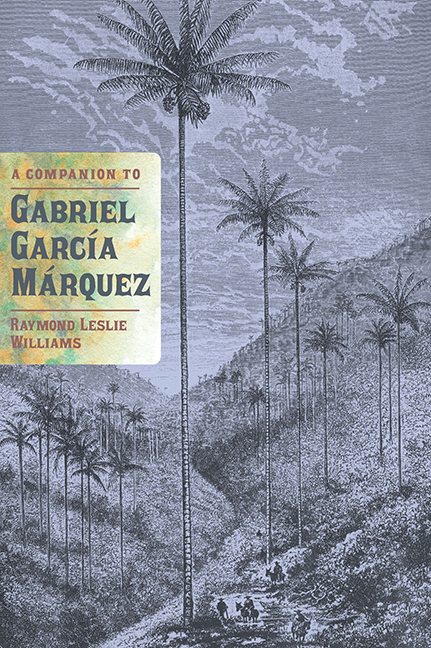Book contents
- Frontmatter
- Dedication
- Contents
- Abbreviations
- Foreword
- 1 García Márquez, the Modernists, and the Boom
- 2 Cien años de soledad and the Macondo Cycle
- 3 El otoño del patriarca and the Political Writings
- 4 Postmodern Gestures: El amor en los tiempos del cólera, Crónica de una muerte anunciada, and La increíble y triste historia de la cándida Eréndira y de su abuela desalmada
- 5 Recent Writing
- 6 Epilogue
- Guide to Further Reading
- Select Bibliography
- Index
Guide to Further Reading
Published online by Cambridge University Press: 26 May 2022
- Frontmatter
- Dedication
- Contents
- Abbreviations
- Foreword
- 1 García Márquez, the Modernists, and the Boom
- 2 Cien años de soledad and the Macondo Cycle
- 3 El otoño del patriarca and the Political Writings
- 4 Postmodern Gestures: El amor en los tiempos del cólera, Crónica de una muerte anunciada, and La increíble y triste historia de la cándida Eréndira y de su abuela desalmada
- 5 Recent Writing
- 6 Epilogue
- Guide to Further Reading
- Select Bibliography
- Index
Summary
The non-specialist as well as the scholar of Latin American literature can easily locate and obtain a vast array of readings on the writing of García Márquez. For the general reader, two early interviews by informed interlocutors appear in the books Into the Mainstream by Luis Harss (1967) and Seven Voices: Seven Latin American Writers Talk by Rita Gilbert (1973). Both contain valuable interviews with García Márquez's Latin American contemporaries, as well as with the author himself. For a more complete set of many of the most insightful interviews with García Márquez, see the compilation edited by Gene Bell-Villada under the title Conversations with Gabriel García Márquez (2006). This contains translations into English of many of the most-cited and revealing interviews with the writer dating back to the early years of his career. In 1982, García Márquez published a lengthy conversation with Plinio Apuleyo Mendoza under the title El olor de la guayaba: conversaciones con Plinio Apuleyo Mendoza (translated as The Fragrance of the Guava). I have co-authored a book with Kevin Guerrieri, Culture and Customs of Colombia (1999), that offers a general introduction to the nation, including a chapter on García Márquez. In addition to these highly accessible books, García Márquez's autobiography, Vivir para contarla (Living to Tell the Tale, 2003), provides much insight for the nonspecialist. In this first of two volumes (the second has yet to appear), García Márquez tells the story of his childhood and formative years; of, that is, the period before the publication of Cien años.
Full-length books on García Márquez range from the introductory to the specialized. Among the former, Gene Bell-Villada's García Márquez: The Man and his Work (1990) is among the more useful. Before Bell-Villada's overview, were Kathleen McNerny's Understanding Gabriel García Márquez (1989), Stephen Minta's Gabriel García Márquez: Writer of Colombia (1987), and George McMurray's Gabriel García Márquez (1987). A pioneer book that is still useful is Mario Vargas Llosa's Gabriel García Márquez: historia de un deicidio (1970). Isabel Rodríguez-Vergara studies satire in four novels after Cien años in El mundo satírico de Gabriel García Márquez (1991). A very well informed scholar with personal access to García Márquez, Gerald Martin, has written an exhaustive and lengthy biography, Gabriel García Márquez: A Life (2008).
- Type
- Chapter
- Information
- A Companion to Gabriel García Márquez , pp. 167 - 170Publisher: Boydell & BrewerPrint publication year: 2021



